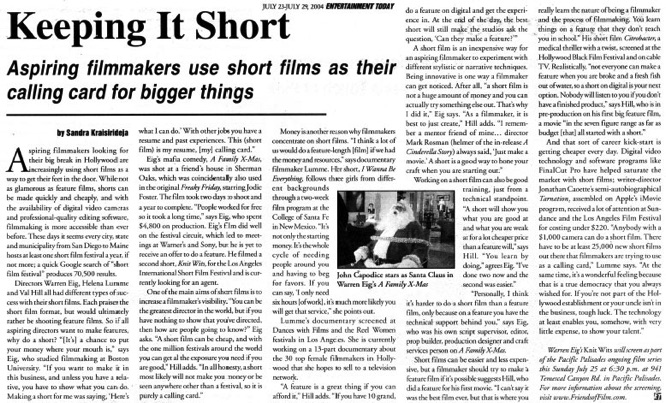
by Sandra Kraisirideja
Aspiring filmmakers looking for their big break in Hollywood are increasingly using short films as a way to get their feet in the door. While not as glamorous as feature films, shorts can be made quickly and cheaply, and with the availability of digital video cameras and professional-quality editing software, filmmaking is more accessible than ever before. These days it seems every city, state and municipality from San Diego to Maine hosts at least one short film festival a year, if not more; a quick Google search of “short film festival” produces 70,500 results.
Directors Warren Eig, Helena Lumme and Val Hill all had different types of success with their short films. Each praises the short film format, but would ultimately rather be shooting feature films. So if all aspiring directors want to make features, why do a short? “[It’s] a chance to put your money where your mouth is,” says Eig, who studied filmmaking at Boston University. “If you want to make it in this business, and unless you have a relative, you have to show what you can do. Making a short for me was saying, ‘Here’s what I can do.’ With other jobs you have a resume and past experiences. This (short film) is my resume, [my] calling card.”
Eig’s mafia comedy, A Family X-Mas, was shot at a friend’s house in Sherman Oaks, which was coincidentally also used in the original Freaky Friday, starring Jodie Foster. The film took two days to shoot and a year to complete. “People worked for free so it took a long time,” says Eig, who spent $4,800 on production. Eig’s film did well on the festival circuit, which led to meetings at Warner’s and Sony, but he is yet to receive an offer to do a feature. He filmed a second short, Knit Wits, for the Los Angeles International Short Film Festival and is currently looking for an agent.
One of the main aims of short films is to increase a filmmaker’s visibility. “You can be the greatest director in the world, but if you have nothing to show that you’ve directed, then how are people going to know?” Eig asks. “A short film can be cheap, and with the one million festivals around the world you can get al the exposure you need if you are good,” Hill adds. “In all honesty, a short most likely will not make you money or be seen anywhere other than a festival, so it is purely a calling card.”
Money is another reason why filmmakers concentrate on short films. “I think a lot of us would do a feature-length [film] if we had the money and resources,” says documentary filmmaker Lumme. Her short, I Wanna Be Everything, follows three girls from different backgrounds through a two-week film program at the College of Santa Fe in New Mexico. “It’s not only the starting money. It’s the whole cycle of needing people around you and having to beg for favors. If you can say, ‘I only need six hours [of work], it’s much more likely you will get that service,” she points out.
Lumme’s documentary screened at Dances with Films and the Reel Women festivals in Los Angeles. She is currently working on a 13-part documentary about the 30 top female filmmakers in Hollywood that she hopes to sell to a television network.
“A feature is a great thing if you can afford it,” Hill adds. “If you have 10 grand, do a feature on digital and get the experience in. At the end of the day, the best short will still make the studios ask the question, ‘Can they make a feature?’”
A short film is an inexpensive way for an aspiring filmmaker to experiment with different stylistic or narrative techniques. Being innovative is one way a filmmaker can get noticed. After all, “a short film is not a huge amount of money and you can actually try something else out. That’s why I did it,” Eig says. “As a filmmaker, it is best to just create,” Hill adds. “I remember a mentor friend of mine… director Mark Rosman (helmer of the in-release A Cinderella Story) always said, ‘Just make a movie.’ A short is a good way to hone your craft when you are starting out.”
Working on a short film can also be good training, just from a technical standpoint. “A short will show you what you are good at and what you are weak at for a lot cheaper price than a feature will,” says Hill. “You learn by doing,” agrees Eig. “I’ve done two now and the second was easier.”
“Personally, I think it’s harder to do a short film than a feature film, only because on a feature you have the technical support behind you,” says Eig, who was his own script supervisor, editor, prop builder, production designer and craft services person on A Family X-Mas.
Short films can be easier and less expensive, but a filmmaker should try to make a feature film if it’s possible suggests Hill, who did a feature for his first movie. “I can’t say it was the best film ever, but that is where you really learn the nature of being a filmmaker and the process of filmmaking. You learn things on a feature that they don’t teach you in school.” His short film Citrobacter, a medical thriller with a twist, screened at the Hollywood Black Film Festival and on cable TV. Realistically, “not everyone can make a feature when you are broke and a fresh fish out of water, so a short on digital is your next option. Nobody will listen to you if you don’t have a finished product,” says Hill, who is in pre-production on his first big feature film, a movie “in the seven figure range as far as budget [that] all started with a short.”
And that sort of career kick-start is getting cheaper every day. Digital video technology and software programs like FinalCut Pro have helped saturate the market with short films; writer-director Jonathan Caoette’s semi-autobiographical Tarnation, assembled on Apple’s iMovie program, received a lot of attention at Sundance and the Los Angeles Film Festival for costing under $220. “Anybody with a $1,000 camera can do a short film. There have to be at least 25,000 new short films out there that filmmakers are trying to use as a calling card,” Lumme says. “At the same time, it’s a wonderful feeling because that is a true democracy that you always wished for. If you’re not part of the Hollywood establishment or your uncle isn’t in the business, tough luck. The technology at least enables you, somehow, with very little expense, to show your talent.”
Warren Eig’s Knit Wits will screen as part of the Pacific Palisades ongoing film series this Sunday July 25th at 6:30 PM at 941 Temescal Canyon Road in Pacific Palisades. For more info about the screening, visit www.FriendsofFilm.com.

John Capodice as Santa Claus in Warren Eig's A Family X-Mas
>> Features
Keeping It Short
Aspiring filmmakers use short films as their calling card to bigger things
